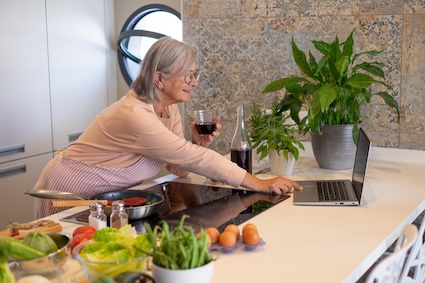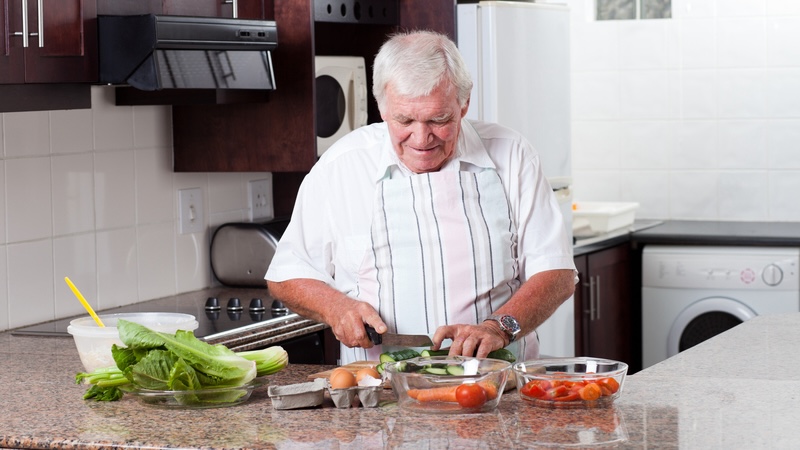Healthy eating increases energy and well-being. These nine tips on healthy meals for seniors who live alone can make it simple to dine on dishes that are delicious and nutritious – whether you’re aging in place or cooking in your senior apartment.
You may love to cook big, extravagant meals for friends and family; however, cooking for yourself may not seem worth the effort. If you recently lost your partner or other members of the household have moved out, cooking for one might even be depressing. Whatever the reason, you may find yourself just grabbing some cheese and crackers, a bag of popcorn, or a frozen microwaveable meal and calling it “dinner.”
But your easy choice may not be good for you. In the short term, such habits can contribute to lower energy, digestive discomfort, and negative mood changes. Over time, poor nutrition leads to heart disease, Type 2 diabetes, deteriorating bone health, weight gain, and increased cognitive decline.
According to Dr. Valentina Remig, registered dietician, “As people get older … they need fewer calories, but the same nutrients.” Here’s what the USDA recommends adults aged 60 or older eat every day to help prevent malnutrition as well as chronic diseases such as osteoporosis, high blood pressure, heart disease, and diabetes:
- Vegetables: 2 to 3½ cups
- Fruits: 1½ to 2 cups
- Grains: 5 to 9 ounces
- Dairy: 3 cups
- Protein: 5 to 6½ ounces
- Oils: 22 to 34 grams
NOTE: Amounts vary based on gender, body size, and physical activity.
Strategies for preparing healthy meals for seniors
Consistently eating nutritious meals can be challenging. These tips and tricks can make healthy meals for seniors a whole lot simpler.
1. Compile your go-to recipes.
Consult cookbooks, browse online and ask your friends for healthy breakfast, lunch and dinner recipes that they enjoy. After you’ve cooked and taste-tested the dishes that appeal to you, create a personal collection of your favorites – either online or in a binder.
Here are some cookbooks featuring healthy meals for seniors: “The Healthy Seniors Cookbook: Ideal Meals and Menus for People Over Sixty”; “The Senior Gourmet: 200 Easy-to-Make Recipes for the Senior Who Wants to Prepare Fresh and Healthy Meals,” and “The Essential Diabetic Diet After 50.”
2. Plan ahead.
 At the end of each week, set aside time to flip through your recipes and plan your meals for the following seven days using a weekly meal planner or a spreadsheet on your computer. (Or do it the old-fashioned way with pen and paper!) Don’t procrastinate and tell yourself you’ll do it tomorrow. On those days you haven’t planned anything, there’s a good chance you won’t eat right. When grocery shopping, always read labels to check nutritional content before you buy.
At the end of each week, set aside time to flip through your recipes and plan your meals for the following seven days using a weekly meal planner or a spreadsheet on your computer. (Or do it the old-fashioned way with pen and paper!) Don’t procrastinate and tell yourself you’ll do it tomorrow. On those days you haven’t planned anything, there’s a good chance you won’t eat right. When grocery shopping, always read labels to check nutritional content before you buy.
3. Stay stocked.
Focusing on healthy meals for seniors is easier if you keep your fridge and pantry stocked with staples like salad greens and veggies, fruit, eggs, cheese, beans, nuts, canned tuna, and oatmeal.
4. Take advantage of leftovers.
Consider repurposing ingredients from one meal to the next. For example, leftover chicken from dinner on Monday night can be chopped up in your salad on Tuesday. Also, you don’t always have to try to cut recipes written for four servings down to serve one. Instead, eat the remainder in the next few days or freeze the extra servings individually to save yourself time in the coming weeks. (The Mayo Clinic advises to only keep leftovers in the refrigerator for three to four days to avoid the risk of food poisoning.)
5. Eat your veggies (and fruits).
Critical for a healthy diet, fruits and vegetables have been proven to reduce the risk of heart disease, stroke, and cancer, to lower blood pressure, and to head off digestive issues. But if you can’t seem to eat fresh produce before it goes bad, try frozen instead. Bags of frozen veggies and fruits not only will last longer but will also, in most cases, be just as nutritious and sometimes even less expensive. They’re also pre-chopped, making it easy to add to your dishes. Just watch out for added ingredients like salt, sugar and sauces.
Related: 6 Vegetables You Should Buy Frozen
6. Bulk up.
Muscle mass declines with age. While this loss is a natural part of aging, deteriorating muscles can increase your risk of frailty, disability, and even death. When you’re cooking for one, a whole turkey or roast isn’t always feasible (unless you repurpose or freeze leftovers). However, it’s easy to bake a filet of fish or a piece of chicken for yourself, open a can of tuna or add eggs, beans, lentils, nuts or cheese to your meals. If you’re still having difficulty getting enough protein in your diet, add protein powder – preferably whey protein – to your meals, but only as a supplement.
Related: Protein to Combat Muscle Loss in Seniors
7. Share the food … and the work.
It’s likely that you have friends and neighbors who are alone like you. Why not plan a regular potluck with them, so you can get a break from cooking every day and enjoy a variety of dishes in the process? And by rotating where you have the dinner, you’ll only occasionally be responsible for hostess duty. If potlucks aren’t your thing, invite guests over to share the fruits of your cooking labor.
8. Engage a nutritious meal service.
Depending upon your budget, you can sign up for Meals on Wheels, use a meal service such as MomsMeals.com (medically tailored meals, subsidized for some clients), or hire a private chef.
9. Don’t forget to treat yourself.
You might find maintaining a healthy, balanced diet unsustainable if you completely deprive yourself of things like ice cream, potato chips, and those irresistible double-chocolate brownies your neighbor makes. Abstaining from indulgences can even lead to anxiety and eating disorders. Every now and then, it’s OK to give in to your sweet (or salty) tooth, assuming you don’t have health problems with sugar or sodium. Just be sure to make it a treat, not a habit!
It’s especially challenging to eat healthy when you’re alone, with no one to keep you accountable or share the work and the joy. But planning, shopping, and cooking to give your body the nutrition it needs will always be worth the effort!





